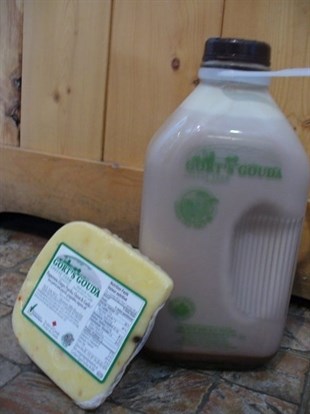
Fourteen Gort's Gouda cheeses have been recalled following an outbreak of E. coli.
Image Credit: Shuswap Tourism
September 20, 2013 - 9:25 AM
OKANAGAN - Health officials say around 500 kg of potentially poisonous cheese entered the marketplace before a recall went into effect, and an Okanagan cheesemaker says “that’s scary."
With one dead and 10 more people across B.C. and Alberta sick with E. coli after eating Salmon Arm’s Gort’s Gouda cheese, the Canadian Food Inspection Agency is urging consumers to check their fridges.
The outbreak, which is believed to have started in July, is considered a class one hazard, meaning it can have fatal results. Affected products were sold on the farm, in retail stores and on the internet between May 27 and September 14.
For a Kelowna cheesemaker who, in ten years of operation in Canada has never had a recall, it’s just plain scary.
“I’m surprised it got this far,” Ofri Barmor of Carmelis Goat Cheese Artisan says. “We send a sample to the lab every month. If something was wrong, it would be picked up right away.”
While the cheese in question is unpasteurized, or raw, health officials still aren’t sure if that fact alone is to blame. By law, raw milk cheeses must be aged for 60 days, long enough for pathogens, including E. coli to die.
“I think it’s actually safer than pasteurized cheeses,” Barmor says.
Fred Jamieson, a food safety recall specialist, says contaminants could have been transferred at any stage of the process.
“What was the vector that could have introduced (the E. coli) from animals to... the finished product and then to the consumer?” Jamieson says.
Gort’s Gouda had another product recalled in 2012, something concerning for Barmor.
“I would be worried, why twice?” she says. “It should never have happened again.”
If it was her business, she says she would have completely overhauled her sanitation system. As a consumer, she says she would be hesitant to buy Gort’s cheese.
“I wouldn’t want to be in (Gort’s Gouda’s) shoes today. It would make a huge hole in the pocket,” she says, noting they will suffer the loss of all the recalled cheese as well as their customers.
As part of the recall, stores can either return the product for credit, or throw it away. If it goes in the dumpster, the CFIA recommends putting bleach on it to kill the harmful bacteria. Some of the product, as the 11 ill people can attest, has already been bought and consumed.
“It could still be sitting in peoples’ refrigerators,” Jamieson says, noting around 70 outlets in B.C. and Alberta carry the product.
He encourages the public to familiarize themselves with the product packaging and to see their physician if they experience cramps or bloody diarrhea.
To contact the reporter for this story, email Charlotte Helston at chelston@infotelnews.ca, call (250)309-5230 or tweet @charhelston.
News from © iNFOnews, 2013